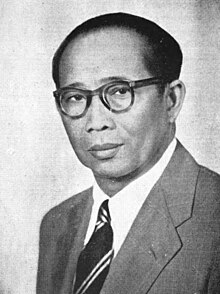Sidik Djojosukarto | |
|---|---|
 Official portrait, 1954 | |
| Chairman of the Indonesian National Party | |
| In office 5 May 1950 – 9 September 1955 | |
| Preceded by | Sujono Hadinoto |
| Succeeded by | Suwiryo |
| Member of the Provisional House of Representatives | |
| In office 16 August 1950 – 9 September 1955 | |
| Member of the Central Indonesian National Committee | |
| In office 26 February 1946 – 16 August 1950 | |
| Personal details | |
| Born | 7 June 1908 Blitar, Dutch East Indies |
| Died | 8 September 1955 (aged 47) Surabaya, Indonesia |
| Political party | PNI (from 1946) |
| Other political affiliations | |
| Occupation |
|
Sidik Djojosukarto (EVO: Sidik Djojosoekarto; 7 June 1908 – 8 September 1955) was an Indonesian politician who served as chairman of the Indonesian National Party (PNI) from 1950 until his death. As PNI chairman, he was revered by all party factions, and was the closest to being an "authentic party hero."[1]
Sidik was born to a small merchant family in Blitar, East Java. After graduating from the Ovts Handelsleergang trade school in 1930, he began work as a teacher in Surabaya. Later, he became a journalist and was later editor-in-chief of the Indonesian newspaper Berdjoeang. In addition to his work as a journalist, Sidik was involved in several pro-independence organizations, becoming a member of the Partindo and Gerindo political parties during the 1930s. During the Japanese occupation of the Dutch East Indies, Sidik became the local head of the Putera and Jawa Hokokai organizations in Kediri.
Following the proclamation of Indonesian Independence, he became chairman of the local branch of the Indonesian National Committee. In 1946, he was appointed a member of the Central Indonesian National Committee (KNIP) and became a member of the KNIP's working body by March 1947. In August 1949, he was appointed acting chairman of the PNI, replacing Sujono Hadinoto. As party chairman, Sidik represented the more conservative faction of the PNI and led the party through much of the liberal democracy period. He died of hypertension on 8 September 1955, while campaigning during the 1955 Indonesian legislative election.
- ^ Rocamora 1970, p. 145.